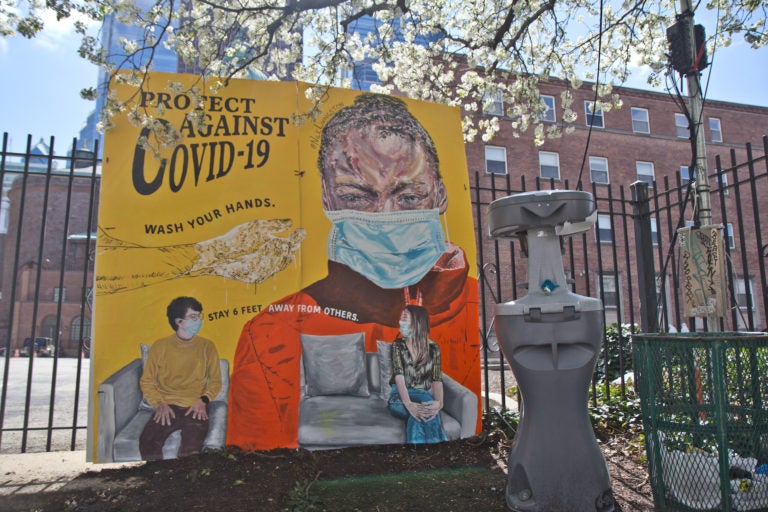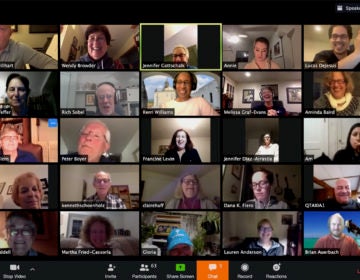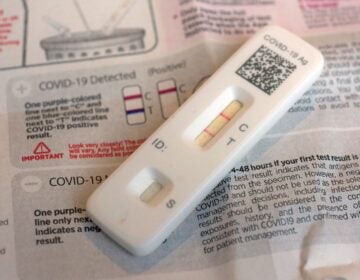Coronavirus update: Pa. receives less than half of emergency supplies requested from federal government
In one of the quickest meetings in Philadelphia City Council history, members approved $85.4 million in emergency funding to help fight the COVID-19 pandemic.

A mural created by artist Nile Livingston was installed at 17th and Vine streets along with a public hand washing station meant for people who are living with housing instability. (Kimberly Paynter/WHYY)
Updated at 5:15 p.m.
–
As of Wednesday morning, there are 7,264 confirmed COVID-19 cases in Pennsylvania, 25,590 in New Jersey, and 368 cases in Delaware. Philadelphia has 2,100 cases.
Pennsylvania’s death toll stands at 90, New Jersey’s at 537, and Delaware’s at 11.
Pa. receives less than half of emergency supplies requested from federal government
Pennsylvania has received less than half of the coronavirus supplies it requested from the federal government, according to Federal Emergency Management documents released by House Democrats.
The list of requested supplies includes personal protective equipment such as gloves, surgical masks, surgical gowns and face shields. It also includes testing supplies.
Pennsylvania requested at least 494,392 N95 respirators. As of Monday, the same day President Donald Trump declared a major disaster in the state, it had only received 112,250, less than a quarter of those requested.
The state requested 3,990 pairs of coveralls, but received only 480, or about 12%.
As of Thursday, Pennsylvania has 7,264 confirmed coronavirus cases. And 90 residents have died from COVID-19.
The House Oversight Committee also documents about requests in Delaware, the District of Columbia, Maryland, Virginia, and West Virginia, which are all part of FEMA Region III.
President Trump’s disaster order, requested by Pennsylvania Gov. Tom Wolf, allows for additional federal funding to flow to local recovery efforts.
Philadelphia experiences rapid growth in coronavirus cases
Philadelphia is still experiencing “rapid growth” in the number of confirmed COVID-19 cases, according to city officials.
As of Thursday afternoon, Philadelphia had 425 new cases, bringing the total to 2,100. There were 360 new cases on Wednesday.
Roughly half of all infections are people under 50.
Seventeen people in Philadelphia have now died from the coronavirus. Nine of them were nursing home residents.
Health Commissioner Thomas Farley said Thursday the city is seeing more “clusters” of COVID-19 cases inside group residential facilities, including nursing homes, behavioral health centers and county jails, where 20 incarcerated people have tested positive for coronavirus.
As a result, Philadelphia has expanded its definition of what it considers a health care worker to include staffers at those sites, said Farley.
Health care workers are among the groups the city is prioritizing for coronavirus testing.
Despite increases in the number of coronavirus cases, 44% of the region’s hospital beds are still available.
There are roughly 12,000 hospital beds in Philadelphia, Bucks, Montgomery, Chester and Delaware counties. There are 560 patients with COVID-19 at hospitals in those counties.
“Their emergency departments are not busy the moment. They’re seeing about half of the number of patients that they see under ordinary times,” said Farley during a virtual news conference.
“We want to keep it that way. We want to make it so our health care system does not become overloaded,” he added
During the news conference, Mayor Jim Kenney also signed into law a bill providing nearly $85 million in emergency funding to bolster the city’s coronavirus efforts, elbow-bumping City Council President Darrell Clarke just before picking up his pen.
The funding will help pay for personal protective gear and ventilators, as well as supplies and salaries at the Liacouras Center, which has been retrofitted to hold 250 additional hospital beds to handle a potential surge in COVID-19 patients.
Staff shortages have put city trash collection a day behind schedule, but residents should continue to put out their garbage on their designated day.
“I’m confident that we’re going to catch up,” said Managing Director Brian Abernathy.
Philly City Council approves $85.4 million in emergency funding
In one of the quickest meetings in Philadelphia City Council history, members approved $85.4 million in emergency funding to help fight the coronavirus pandemic.
“This is for us to deal with immediate need,” said Council President Darrell Clarke said. “$85 million will not be all we need for the city of Philadelphia to get us through this, but it is the most immediate need.”
The bill moves money from the city’s current Fiscal Year 2020 budget, and is expected to help fund a range of efforts to help deal with the COVID-19 outbreak.
It was City Council’s first-ever virtual meeting and ran about 12 minutes from start to finish. Clarke was the only member in the chambers at City Hall. The rest participated via phone and online.
Clarke says the virtual session could be a template for upcoming budget hearings, which are necessary to produce a city budget by July first.
Pa. lawmakers introduce bills to address rise in hate crimes
Pennsylvania lawmakers are introducing a slew of bills that would strengthen the state’s hate crime laws after reports of increased harassment against Asian Americans during the pandemic.
“We know that hate certainly does not take a pause during COVID-19 and neither [do] our attempts to eradicate it in Pennsylvania,” State Sen. Larry Farnese, who represents parts of Philadelphia, including Chinatown.
Farnese is backing a bill that would let the state’s attorney general track hate groups through a database, which would also be available to law enforcement agencies.
Another bill in the package would require anyone convicted of ethnic intimidation to take educational classes “relating to the motivating factor of the underlying crime.” An additional bill that would require postsecondary institutions to create anonymous hate crime reporting for students and staff.
Farnese said when social distancing measures were first put into place in the region, the first calls “were not about essential businesses being open, or courts, or even employment.”
“They were about the Asian American community who were literally frightened by the words that were coming out of national leadership,” he said referring to President Donald Trump’s press conferences where he called COVID-19 the “Chinese virus.”
Asian American activists have argued that type of language stigmatizes their communities.
Though data lags, anecdotally it appears Asian Americans have experienced an increase in verbal and physical abuse.
Marian Lien, president of OCA-Asian Pacific American Advocates’ Pittsburgh chapter, said she’s heard of college students being shunned and she described an instance of verbal harassment she experienced.
“During a visit to the market last week, I was told to go and shop with my own kind that I should take the disease, the virus, and be shipped back to China,” Lien said, adding she didn’t report the incident because of the initial shock.
Though bias incidents are primarily handled by local law enforcement, State Police Sgt. William Slaton, Commander of the Heritage Affairs section within the Equality and Inclusion Office, promised to offer assistance should any local departments need it.
Pa. cases rise
On Thursday, the Pennsylvania Department of Health reported 1,211 new cases of COVID-19, bringing the statewide total to 7,264 in 62 counties.
The department also recorded 16 new deaths, bringing the statewide total to 90.
“We know that these prolonged mitigation effects have been difficult for everyone, but it is essential that everyone follows these orders and does not go out unless they absolutely must,” said Secretary of Health Dr. Rachel Levine in a statement.
While absolute numbers are surging in southeastern and northeastern Pennsylvania, the caseload in the northeast is higher on a per capita basis.
“We’re tracking it very closely and we need to make sure that the hospitals in those areas are prepared to take care of those patients,” said Levine, during a press conference on Thursday.
Statewide, about one in ten people confirmed to have COVID-19 have required hospitalization, and 216 needed intensive care. The virus is now present in all but 5 counties, prompting Governor Tom Wolf to place the entire state on lockdown as of Wednesday.
Who is getting infected also continues to correlate with vulnerable populations and frontline workers. Ten percent of nursing homes have at least one confirmed case, said Levine, and more than 300 health care workers have been infected.
Answering calls for more data on how tests are being administered, she said the Pennsylvania Department of Health is not releasing the overall number of tests administered county-by-county because so far that information has been “not that useful.”
Tracking who has recovered will be easy once there are approved tests to measure coronavirus antibodies in people who are not currently showing symptoms.
State police continue to issue warnings to businesses
As of Thursday, troopers with the Pennsylvania State Police have issued 136 warnings in connection to a state order requiring all non-life sustaining businesses to close their brick-and-mortar locations during the coronavirus pandemic.
Troopers have warned a total of five businesses in Philadelphia, Montgomery and Delaware Counties.
“At this point, none of the businesses have been warned twice,” said Trooper Brent Miller.
The state is not identifying which businesses have been warned, and state police have so far not issued any citations for violating the order, which shuttered most retail, as well as construction sites across the state. Businesses can apply for waivers to be exempted from the shutdown order, but the approval process has sown confusion among many business owners.
“We’re taking more of an educational, proactive approach to it,” said Miller, adding that most businesses are complying with the order and staying closed.
Also enforcing the state order are the Pennsylvania Liquor Control Board, the Pennsylvania Department of Health, the Pennsylvania Department of Agriculture, as well as local police and local officials.
Bucks County sees community spread among essential workers
Bucks County officials struck a positive note Thursday while still warning residents that more COVID-19 cases are to come.
Confirmed coronavirus cases in the county grow by about 35 to 55 people per day, but have not been doubling exponentially, said Dr. David Damsker, leader of the county’s Health Services Division during a virtual press conference.
“We are seeing a decrease in the numbers of people where they don’t know where the heck they got it,” said Damsker.
The community spread that is happening seems to be occurring mostly in essential workers, such as health care providers and grocery store employees.
As for a shipment of personal protective equipment that arrived Wednesday, county officials said they’re dividing it up to give to hospitals, nursing homes and other health care providers. Competition for these supplies remains steep.
While optimistic, the county commissioners would not share projections for when they might loosen restrictions.
“We gotta take this really seriously,” said Commissioner Gene DiGirolamo. “There is no magic in getting away with this.”
Montco predicts coronavirus peak in mid-April
Based on model projections, Montgomery County officials said Thursday they expect the number of coronavirus cases to peak around the middle of April.
The county now has 707 confirmed cases of coronavirus and 12 deaths.
During a Thursday news conference, County Commissioner Dr. Val Arkoosh reported 113 new positive cases and two additional coronavirus-related deaths — a 79-year-old man from Springfield Township and an 86 year-old-man from Upper Providence Township.
Both were hospitalized and had underlying conditions.
“I want people to understand, that doesn’t mean we had this huge surge of new cases today,” said Arkoosh. “We get these lab results back. Sometimes we get 20 from a commercial lab. And the next day we might get 80 from a commercial lab.”
A better indicator of the virus’ spread, said Arkoosh, is the percentage of daily coronavirus tests that come back positive for the infection. Currently, that number is hovering between 13-15% each day.
During a surge, that percentage would increase.
“Happily, so far, we are not seeing that,” said Arkoosh.
WHYY’s Ximena Conde, Tom MacDonald and Laura Benshoff contributed reporting.
WHYY is your source for fact-based, in-depth journalism and information. As a nonprofit organization, we rely on financial support from readers like you. Please give today.





![CoronavirusPandemic_1024x512[1]](https://whyy.org/wp-content/uploads/2020/03/CoronavirusPandemic_1024x5121-300x150.jpg)


